Dealing with a patient with severe depression may be quite challenging. An advanced practice nurse needs to make the best decisions to ensure the best outcome. Before any decision is made, a depression scale must be administered to identify the intensity of the condition. The first decision point features the administration of Zoloft 25 mg orally every day. This client will be expected to return for a checkup in four weeks.
When the client returns with a report of decreased symptoms, it will be evident that the intervention was successful (Donelan, Walker & Salek, 2015). However, a concern may arise over the problem of erectile dysfunction that was previously not being experienced. At this point, it is best to reduce the dose to 12.5 mg orally every day. In another four weeks, the client is expected to come back for a checkup. However, the erectile dysfunction has subsided while the depressive symptoms worsened. The best decision at this point is to return the initial dose and watch out for the side effect of erectile dysfunction (Balestra, 2019). If it happens, another drug may need to be used. The best option will be to change to Paxil 20 mg since it is not expected to have a similar side effect.
During the return visit in four weeks, the patient indicates that he stopped taking the drugs as it impacted his self-esteem greatly. Restarting the drug at the previous dose will not be appropriate as the side effects will still be experienced. However, it is best to consider restarting with 50% of the initial dose to determine whether or not the erectile dysfunction is related to the drug ('Relationships Between Decision-Making Processes,' 2020). If the problem resurfaces once the full dose is attained, then the best measure will be to consider changing to Wellbutrin XL ('Advance care planning,' 2018). The problem is that this drug may considerably trigger insomnia.
The pharmacotherapeutic interventions are affecting the patient's pathophysiology in various ways. Since every drug has a unique mode of action, specific side effects are triggered. That is why it is essential to understand when to change the dosage and when to change to a new drug. The patient should not have to suffer from the side effects without getting help.
References
Balestra, M. (2019). Family Nurse Practitioner Scope of Practice Issues When Treating Patients With Mental Health Issues. The Journal For Nurse Practitioners, 15(7), 479-482. doi: 10.1016/j.nurpra.2018.11.007
Advance care planning and anticipatory decision making in patients with Alzheimer's disease. (2018). The Nurse Practitioner, 43(6), 31-32. doi: 10.1097/01.npr.0000534861.40262.08
Relationships Between Decision-Making Processes in Developing Clinical Judgment Skills. (2020). Nurse Educator, 1. doi: 10.1097/nne.0000000000000776
Donelan, R., Walker, S., & Salek, S. (2015). Factors influencing quality decision-making: regulatory and pharmaceutical industry perspectives. Pharmacoepidemiology And Drug Safety, 24(3), 319-328. doi: 10.1002/pds.3752
Cite this page
Essay Example on Advanced Practice Nurse Decides Zoloft for Severe Depression. (2023, Mar 26). Retrieved from https://proessays.net/essays/essay-example-on-advanced-practice-nurse-decides-zoloft-for-severe-depression
If you are the original author of this essay and no longer wish to have it published on the ProEssays website, please click below to request its removal:
- Paper Example on HIV Positive Immigrants Travel to the United States
- Developing a Health Advocacy Campaign: Ethical Dilemma in Advocacy for Type-2 Diabetes
- Pressure Ulcer Management Among ICU Nurses in Saint Elizabeth Facility
- Public Health Policy Analysis on Infectious Disease Reemergence - research-paper
- Paper Example on Exploring the Impact of Age on Life Experiences: A Study of Three Individuals
- Essay Example on 1918 Flu Pandemic: Lessons for COVID-19 in 4 Charts
- Paper Exploring Recidivism Risk Assessment and Interventions: Key Insights from Recent Research







